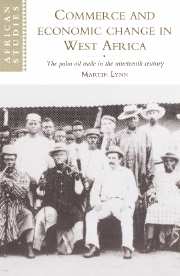Book contents
- Frontmatter
- Contents
- List of maps
- List of tables
- Preface
- List of abbreviations
- Introduction
- Part I The development of the palm oil trade in the first half of the nineteenth century
- Part II The restructuring of the palm products trade in the second half of the nineteenth century
- Conclusion
- Notes
- Select bibliography
- Index
- Other books in the series
Conclusion
Published online by Cambridge University Press: 04 December 2009
- Frontmatter
- Contents
- List of maps
- List of tables
- Preface
- List of abbreviations
- Introduction
- Part I The development of the palm oil trade in the first half of the nineteenth century
- Part II The restructuring of the palm products trade in the second half of the nineteenth century
- Conclusion
- Notes
- Select bibliography
- Index
- Other books in the series
Summary
It may be facile to speak of individual centuries as if they represent a distinct period in historical reality, yet the nineteenth century has a unity in the history of West Africa's export trade. Slaving continued for several decades after 1807 across the Atlantic – and for even longer across the Sahara – but in terms of West Africa's economic history this was the century of legitimate trade. Until the destruction of the coastal brokers' powers at the end of the century, this was a period when West Africans produced agricultural commodities for the world market, and transported, bulked, and brokered those commodities within their own independent states and societies.
Of the agricultural commodities that West Africans produced for the world market in the nineteenth century, palm oil and kernels were by far the most important for large parts of the region. When one considers the numbers of farmers, specialist palm climbers, oil processors, kernel crackers, porters, canoemen, brokers, pilots, and labourers involved – not to mention those producing the foodstuffs, canoes, mortars, baskets, calabashes, and other products required to facilitate the trade – it is clear that the production and trade of palm produce played a major role in West Africa's export economy. Equally, this trade had an important, if too often ignored, impact on the population of Britain. The products of West Africa's palm oil industry spread deep into the households of industrial Britain in the nineteenth century. With items such as Price's candles, ‘Sunlight’ soap, and Van den Bergh's margarine, there can have been few, if any, British households that did not receive the produce of West Africans' labour in these years.
- Type
- Chapter
- Information
- Commerce and Economic Change in West AfricaThe Palm Oil Trade in the Nineteenth Century, pp. 188 - 190Publisher: Cambridge University PressPrint publication year: 1997

